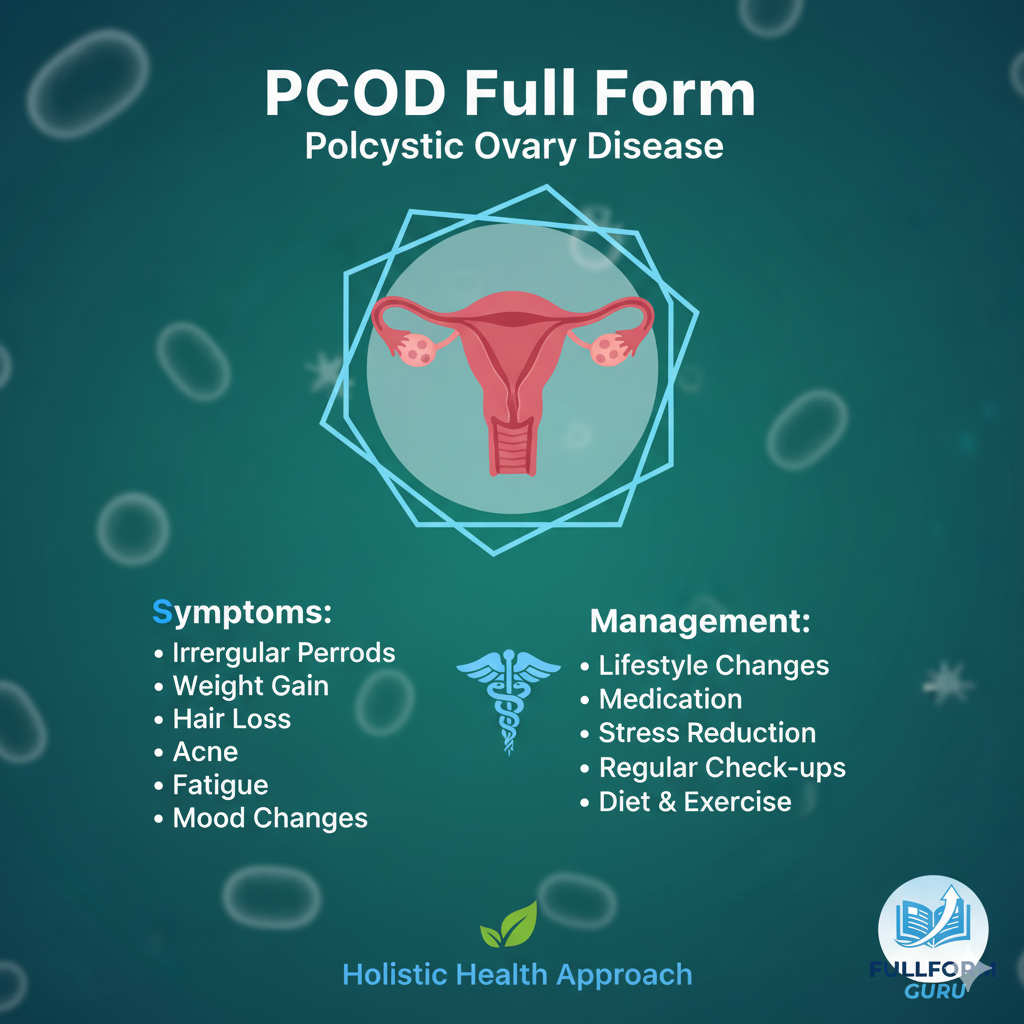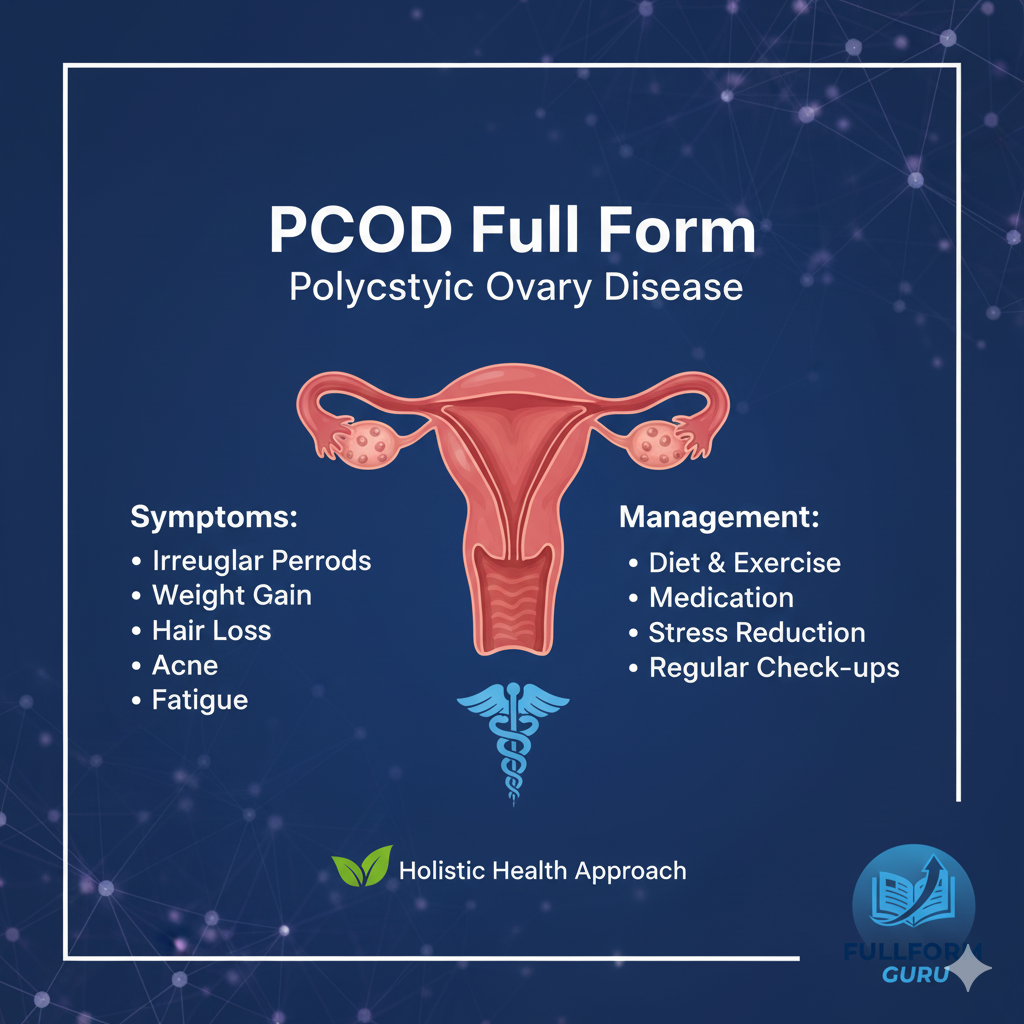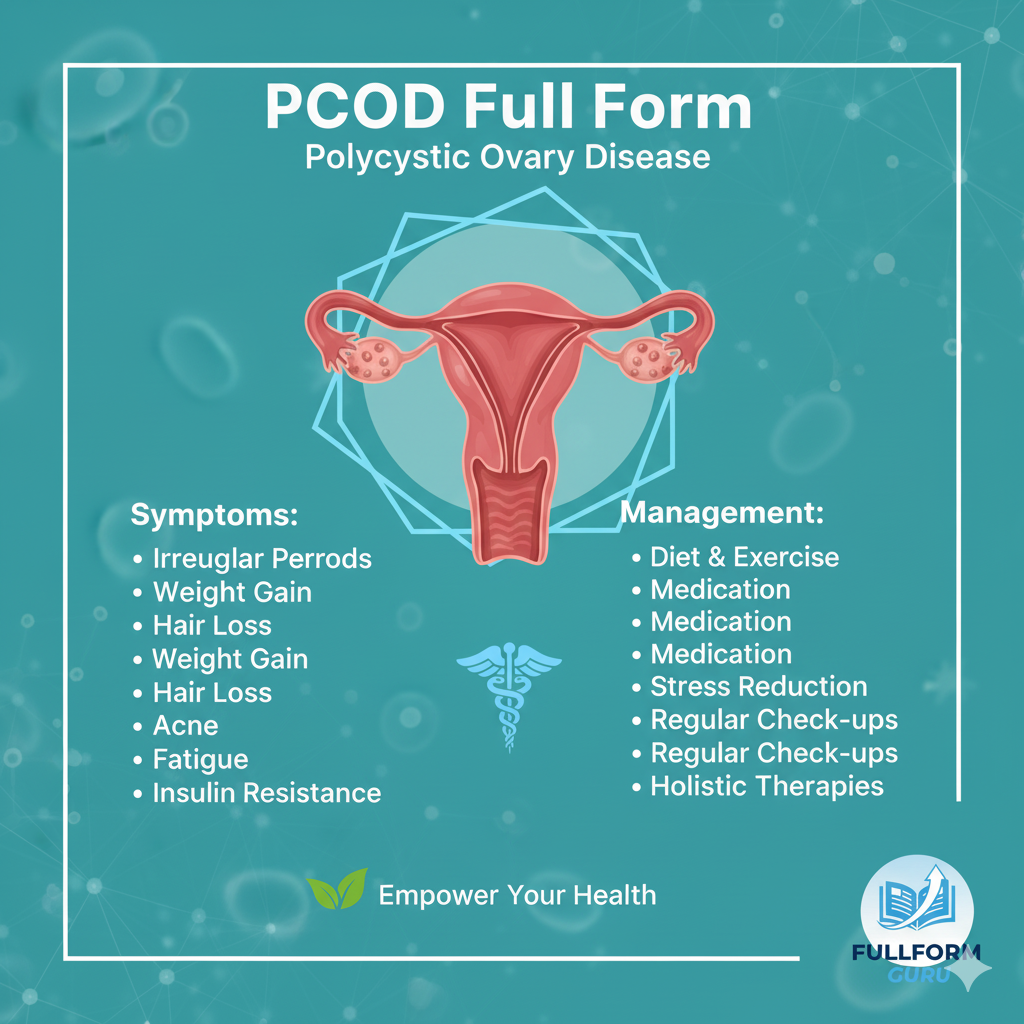
PCOD Full Form – Causes, Symptoms, Diagnosis, Treatment, and Management
Introduction
PCOD Full Form stands for Polycystic Ovary Disease is a common hormonal disorder affecting women of reproductive age worldwide. This condition arises from a hormonal imbalance in the ovaries, causing irregular menstrual cycles, cysts, and additional health issues. PCOD not only impacts physical health but can also affect emotional well-being, fertility, and overall quality of life. Understanding PCOD Full Form , its causes, symptoms, and management is essential for women everywhere to maintain a healthy lifestyle and prevent complications.
The Full Form & Meaning of PCOD
PCOD Full Form stands for Polycystic Ovary Disease, a common hormonal condition affecting women. It is a condition in which a woman’s ovaries develop multiple small cysts due to hormonal imbalances. These cysts can interfere with regular ovulation, causing irregular periods, fertility problems, and other symptoms. PCOD is commonly associated with excessive production of androgens (male hormones) and insulin resistance, which affect overall hormonal balance. While it is different from PCOD Full Form (Polycystic Ovary Syndrome), the terms are sometimes used interchangeably in everyday discussions.
Causes of PCOD
PCOD can develop due to a combination of genetic, hormonal, and lifestyle factors. Some of the most common causes include:
- Hormonal Imbalance – Excess production of androgens (male hormones) can disrupt ovulation.
- Insulin Resistance – High insulin causes more androgen production, which can cause irregular menstrual cycles.
- Genetic Factors – Family history of PCOD or PCOS can increase the likelihood of developing the condition.
- Lifestyle Factors – Poor diet, sedentary habits, and stress may contribute to the development or worsening of PCOD.
Understanding these causes helps women identify risk factors and take preventive measures early.
Symptoms of PCOD
PCOD presents a variety of symptoms, and they can vary from person to person. Common signs include:
- Irregular Menstrual Cycles – Periods may be infrequent, prolonged, or absent.
- Excess Hair Growth (Hirsutism) – Increased facial and body hair due to high androgen levels.
- Acne and Oily Skin – Hormonal imbalances often cause skin problems.
- Weight Gain – Especially around the abdomen, linked to insulin resistance.
- Hair Thinning or Hair Loss – Often on the scalp, a result of hormonal changes.
- Difficulty in Conceiving – Irregular ovulation can affect fertility.
Early detection of these symptoms can help in managing PCOD effectively and prevent complications.

Health Risks and Complications of PCOD
If left unmanaged, PCOD can lead to several long-term health issues. Some of the most common risks include:
- Infertility – Irregular ovulation can make conceiving difficult.
- Type 2 Diabetes – Insulin resistance increases the risk of developing diabetes.
- Heart Disease – Hormonal imbalance and weight gain may contribute to cardiovascular problems.
- High Blood Pressure and Cholesterol – Common among women with PCOD, increasing health risks.
- Endometrial Cancer – Irregular periods and hormonal imbalance may elevate the risk over time.
- Mental Health Issues – Anxiety, depression, and low self-esteem can result from symptoms and lifestyle impact.
Awareness of these risks highlights the importance of early diagnosis and effective management of PCOD.
Diagnosis and Tests for PCOD
PCOD is diagnosed by reviewing medical history, conducting a physical examination, and performing laboratory tests. Key steps include:
- Medical History – Doctors ask about menstrual cycles, weight changes, hair growth, and family history.
- Physical Examination – Checking for signs like excess hair growth, acne, and weight distribution.
- Blood Tests – Measure hormone levels, including androgens, insulin, and thyroid function.
- Ultrasound Scan – Detects cysts on the ovaries and examines the uterine lining.
- Additional Tests – Depending on symptoms, doctors may check glucose tolerance, lipid profile, or other relevant parameters.
Early and accurate diagnosis helps in creating a personalized treatment plan to manage PCOD effectively.
Treatment and Management of PCOD
Managing PCOD requires a combination of lifestyle changes, medication, and sometimes medical procedures. Effective treatment helps control symptoms, improve fertility, and reduce long-term health risks. Key approaches include:
- Lifestyle Modifications – Consuming healthy meals, staying active, and maintaining a healthy weight support hormone balance and reduce insulin resistance.
- Medications – Doctors may prescribe hormonal birth control to regulate periods, anti-androgen drugs to reduce excess hair growth, or insulin-sensitizing medications.
- Fertility Treatments – Women trying to conceive may use ovulation-inducing medications or assisted reproductive techniques.
- Regular Monitoring – Ongoing check-ups help track hormone levels, weight, and overall health.
A combination of these strategies allows women to manage PCOD effectively and lead a healthy, fulfilling life.
Diet and Lifestyle Tips for Managing PCOD
A healthy lifestyle plays a crucial role in controlling PCOD symptoms. Practical tips include:
- Balanced Diet – Focus on whole grains, lean proteins, fruits, vegetables, and healthy fats.
- Limit Sugary and Processed Foods – Helps manage insulin levels and weight.
- Regular Exercise – At least 30 minutes daily; includes cardio, strength training, and yoga.
- Stay Hydrated – Drinking enough water supports metabolism and hormonal balance.
- Stress Management – Meditation, deep breathing, and engaging in hobbies can reduce stress-related hormonal changes.
- Sufficient Rest – 7–8 hours of nightly sleep promotes balanced hormonal health.
Consistent lifestyle changes can reduce symptoms, improve fertility, and enhance overall well-being.

PCOD vs PCOS: Key Differences
| Feature | PCOD (Polycystic Ovary Disease) | PCOS (Polycystic Ovary Syndrome) |
| Definition | Ovaries develop multiple small cysts due to hormonal imbalance | A syndrome with a broader set of symptoms, including hormonal, metabolic, and ovarian issues |
| Severity | Usually milder and easier to manage | Can be more severe, affecting multiple body systems |
| Symptoms | Irregular periods, mild weight gain, acne, excess hair | Irregular periods, severe acne, significant weight gain, and fertility issues |
| Treatment | Lifestyle changes, medication for symptoms | Lifestyle, medications, and sometimes advanced fertility treatments |
| Long-Term Risks | Mild insulin resistance, minor fertility issues | Higher risk of diabetes, heart disease, and infertility |
Understanding the differences helps in better management and selecting the appropriate treatment approach.
Tips for Early Detection and Prevention of PCOD
Early detection of PCOD can make management easier and reduce long-term health risks. Some practical tips include:
- Track Menstrual Cycles – Note irregularities or missed periods to detect early signs.
- Monitor Weight and Body Changes – Sudden weight gain or excess hair growth may indicate a hormonal imbalance.
- Regular Health Check-Ups – Blood tests for hormone levels and ultrasounds can help detect PCOD early.
- Adopt a Healthy Lifestyle – A nutritious diet, regular exercise, and stress management reduce risk factors.
- Family History Awareness – Women with relatives who have PCOD/PCOS should be extra vigilant.
Early action can help manage symptoms effectively, improve fertility, and prevent complications like diabetes or heart disease.
Common Mistakes and Myths About PCOD
Even with proper knowledge, many women make simple mistakes that can worsen PCOD:
- Thinking only overweight women get PCOD – it can affect all body types.
- Believing PCOD always causes infertility, many women can conceive naturally or with treatment.
- Ignoring irregular periods – early consultation helps prevent complications.
- Self-medicating can disrupt hormonal balance.
- Living unhealthily, eating poorly, and being inactive can intensify symptoms.
Being aware of these common myths helps in early detection and effective management.
Conclusion
Polycystic Ovary Disease (PCOD) is a widespread hormonal disorder, yet timely management and a healthy lifestyle can reduce symptoms effectively. Regular monitoring, a balanced diet, exercise, and medical guidance empower women to take charge of their health and reduce long-term risks.Start taking small steps today – track your health, adopt healthy habits, and stay consistent. Every positive change brings you closer to a healthier and happier life.




